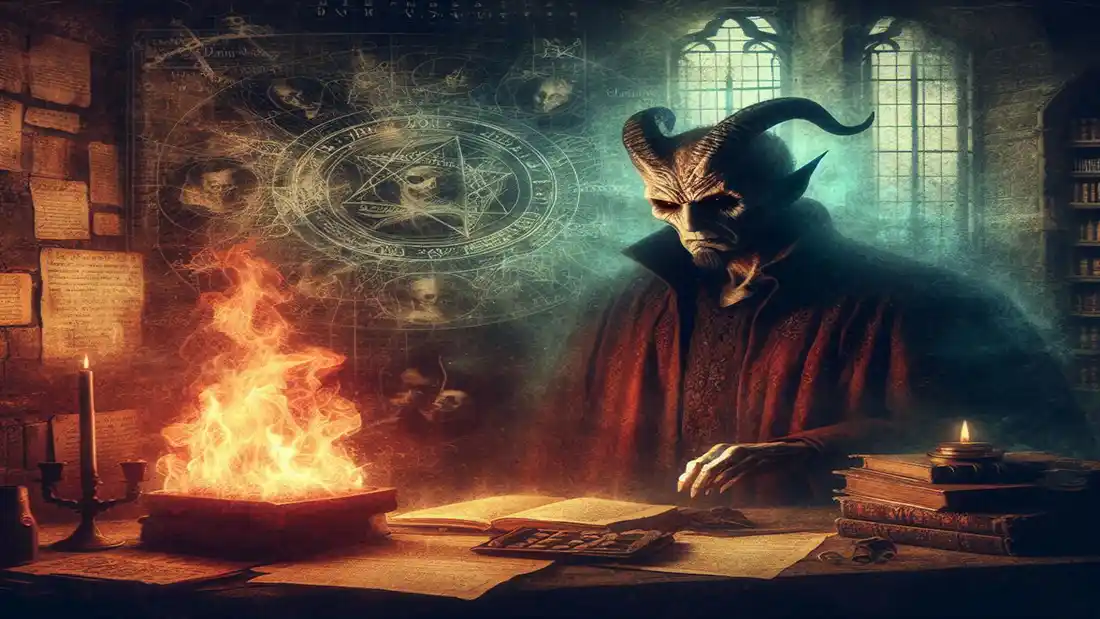Welcome to BD JOBZ PREPARATION! Today, we delve into one of the most fascinating characters in English literature—Mephistophilis from Christopher Marlowe’s Doctor Faustus. The character of Mephistophilis is not just a typical demon but a deeply complex figure filled with emotions, contradictions, and tragic depth. His role in Faustus’s journey is crucial, as he serves both as a tempter and a warning. In this blog post, we will explore the different aspects of Mephistophilis’s character and how he contributes to the overall themes of the play.
Read More: Character of Doctor Faustus
Character of Mephistophilis

The character of Mephistophilis in Christopher Marlowe’s play Doctor Faustus is one of the most complex and intriguing figures in English literature. He is a demon who serves Lucifer and plays a crucial role in Faustus’s downfall. Mephistophilis is not just an ordinary tempter; he is a character filled with depth, emotions, and contradictions. While he acts as a guide for Faustus in his journey of forbidden knowledge, he also serves as a warning about the consequences of dealing with the devil.
From the very beginning, the character of Mephistophilis is presented as a powerful yet tragic figure. When Faustus first summons him, he appears not because of Faustus’s magical abilities but because he has sensed that Faustus is already inclined towards evil. This shows that Mephistophilis is not just a servant who follows orders; he actively seeks out those who are vulnerable to sin. He immediately warns Faustus about the horrors of hell and the consequences of turning away from God. However, instead of taking this warning seriously, Faustus dismisses it, believing that hell is not real suffering but merely a fable. This moment establishes Mephistophilis as a character who understands pain and loss, unlike Faustus, who is blinded by his ambition.
One of the most striking aspects of the character of Mephistophilis is his deep sorrow. Unlike many other representations of demons in literature, Mephistophilis is not entirely evil. He openly expresses his regret about being cast out of heaven. When Faustus asks him how he left heaven, Mephistophilis responds with deep sadness, saying that he was once among the angels who enjoyed eternal bliss but was now condemned to suffer forever. This response shows that even demons can experience loss and regret. Despite his role in tempting Faustus, Mephistophilis does not seem to take pleasure in his master’s eventual damnation. Instead, he appears to be fulfilling his duty while carrying the weight of his own suffering.
Throughout the play, the character of Mephistophilis plays a dual role. On one hand, he is a servant of Lucifer, ensuring that Faustus remains loyal to his contract. On the other hand, he serves as a mirror, reflecting Faustus’s foolishness and arrogance. Every time Faustus speaks about his grand ambitions, Mephistophilis subtly reminds him of the cost of his decisions. For example, when Faustus desires to learn about the secrets of the universe, Mephistophilis provides answers that are often disappointing or incomplete. He does not give Faustus true wisdom but instead keeps him occupied with illusions. This manipulation shows that while Mephistophilis is bound to serve Faustus, he still remains loyal to Lucifer and his mission to claim human souls.
Another important aspect of the character of Mephistophilis is his ability to deceive. Though he tells Faustus the truth about hell and suffering, he also distracts him with pleasures and entertainment. When Faustus begins to doubt his choices and considers repenting, Mephistophilis and Lucifer quickly intervene. They present him with visions and spectacles that entertain and amaze him, making him forget his doubts. This tactic is crucial in ensuring that Faustus remains loyal to his contract until the very end. Even when Faustus finally realizes that he has made a terrible mistake, it is too late for him to escape his fate. Mephistophilis does not force Faustus to sin; instead, he guides him down a path where Faustus willingly chooses sin over salvation.
Despite being a demon, Mephistophilis is not heartless. His expressions of sorrow, his warnings to Faustus, and his lack of enthusiasm in carrying out his duties make him a tragic character. He is not free but is bound by his own contract with Lucifer, just as Faustus is. This similarity between the two characters adds another layer of depth to the play. Faustus believes he is gaining power through his deal, but in reality, he is becoming just like Mephistophilis—a servant bound by forces greater than himself.
In conclusion, the character of Mephistophilis in Doctor Faustus is far more than a simple antagonist. He is a complex and multi-dimensional figure who represents both temptation and tragedy. His role in the play is not just to lead Faustus to damnation but also to serve as a reminder of the suffering that comes with sin. Mephistophilis’s warnings, his sorrow, and his ultimate success in claiming Faustus’s soul all contribute to the play’s powerful message about ambition, knowledge, and the consequences of turning away from God.
Read More: Doctor Faustus-Act 5 Summary
At BD JOBZ PREPARATION, we aim to provide in-depth literary insights that help students and literature enthusiasts better understand classic works. The tragic fate of Mephistophilis and Faustus serves as a timeless lesson about the dangers of unchecked ambition and the consequences of making deals with dark forces. Stay connected with BD JOBZ PREPARATION for more literary analyses and educational content!



